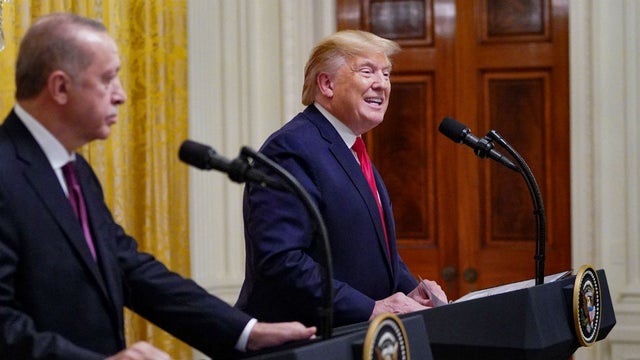President Trump and Turkish President Recep Tayyip Erdoğan had a chummy meeting at the White House today just a month after they ignited a bipartisan firestorm in Washington over Ankara’s invasion of northern Syria.
In a meeting overshadowed by the drama of the House’s first public impeachment hearing, even the joint press conference between the two leaders started with a question about the Democratic-led hearings at the other end of Pennsylvania Avenue.
“You’re talking about the witch hunt,” Trump said, adding that he didn’t watch the proceedings.
“I hear it’s a joke,” Trump continued, saying he was told the witnesses testifying today relied on “thirdhand information.”
Trump faced high stakes in the meeting with Erdoğan that was opposed by Democrats and some of his fellow Republicans.
Lawmakers in both parties have been fuming since Trump, following a phone call with Erdoğan, decided in October to withdraw U.S. troops from northeast Syria.
The withdrawal paved the way for Erdoğan to move forward with a long-threatened offensive against Syrian Kurdish forces.
Ankara considers the Kurds terrorists connected to a Turkish Kurdish insurgency, but the United States relied on the Kurds to fight ISIS in Syria.
Trump has since reversed his plan to withdraw all U.S. troops from Syria.
He stressed today that “we left troops behind only for the oil.”
Defense Secretary Mark Esper told reporters traveling with him in Asia on Wednesday the United States would leave 500 to 600 troops in Syria.
In contrast to Trump’s focus on oil, Esper stressed “our mission was, is and remains the enduring defeat of ISIS.”
While the Syria invasion has led to icy relations between Congress and Turkey, Trump and Erdoğan displayed an easy rapport during their meetings.
Trump touted that he and Erdoğan are “very good friends,” adding later that Erdoğan is “doing a fantastic job for the people of Turkey.”
Trump also claimed Erdoğan has a “great relationship” with the Kurds amid reports of ethnic cleansing in the Syria offensive.
Erdoğan, for his part, used his White House platform to swipe at Congress.
Erdoğan blasted those supporting Kurdish “terrorist organizations” as “deeply disturbed” and aimed at “harming our relations” with the United States.
Erdoğan also railed against the House for passing a resolution recognizing the Armenian genocide.
“Some historical developments and allegations are being used in order to dynamite our reciprocal and bilateral relations,” Erdoğan said through a translator. He expressed hope that the “Senate will take the United States out of this vicious cycle.”
Trump invited five Republican senators to meet with Erdoğan at the White House: Sens. Lindsey Graham (S.C.), Jim Risch (Idaho), Ted Cruz (Texas), Joni Ernst (Iowa) and Rick Scott (Fla.).
Still, the friendship between Trump and Erdoğan appeared to do little to bridge the divide on other issues that have caused friction in U.S.-Turkish relations.
The United States removed Turkey from the F-35 fighter jet program earlier this year after Ankara bought a Russian-made S-400 missile defense system.
U.S. law requires sanctions on those who do business with Russia’s defense industry, but Trump has yet to levy sanctions on Turkey for the S-400.
Trump has floated a $100 billion trade deal as an enticement for Turkey to keep the S-400 turned off.
Trump and Erdoğan announced no resolutions on the trade deal or S-400.
Trump said he and Erdoğan agreed to work toward the trade agreement.
“We’ve asked our secretary of State and minister of foreign affairs and our respective national security advisers to immediately work on resolving the S-400 issue,” Trump added.
In a letter today, bipartisan lawmakers warned the State Department and D.C.’s Metropolitan Police Department to increase security for protesters demonstrating against Erdoğan’s visit, criticizing the violent assault by Turkish security officers during the Turkish leader’s visit in 2017.
As Trump and Erdoğan met inside the White House, protesters gathered outside, waving flags representing the YPG Kurdish forces Turkey is fighting in northeastern Syria, as well as Armenian, Iraqi-Kurdish and Greek flags.
Protesters shouted slogans calling Erdoğan a “terrorist” and part of “ISIS.”
A smaller group later moved to Sheridan Circle outside the Turkish ambassador’s residence, the site of the 2017 attack by Turkish security officers that injured 11 people.
MPD said they made no arrests.
Aram Hamparian, executive director of the Armenian National Committee of America, and one of the protesters present in 2017, said the group stood outside the ambassador’s residence to reinforce their First Amendment rights.
“This remains American soil,” he said. “The Constitution still stands, the First Amendment, freedom of the American people, still is strong.”
